Stay in the know on all smart updates of your favorite topics.
Week of the Circular Economy #1: Upcyclecentre Almere
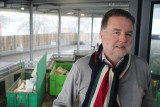
Throughout the week of the Circular Economy, we are shining a spotlight on inspiring sustainable initiatives in the Netherlands. Meet the pioneers, learn from them and get inspired! First up is Henk Martens: Programme Manager of the Upcyclecentre in Almere.
Throughout the week of the Circular Economy, we are shining a spotlight on inspiring sustainable initiatives in the Netherlands. Joining forces with startups, social entrepreneurs, creative professionals, leading companies, and forward thinking governments, to showcase what a circular economy can look like. Meet the pioneers, learn from them and get inspired! First up is Henk Martens: Programme Manager of the Upcyclecentre in Almere.
So, Henk, can you tell us what the Upcyclecentre is all about?
The Upcyclecentre contributes to a circular economy in which raw materials are reused optimally. Residents bring in their waste, and startups on site design and create products from the waste. Old goods gain new economic value, value which in some cases may be higher than the original value. It’s a new concept; people may say it’s the first upcycle centre in Europe. Almere wants to show residents, companies, and other cities that it is possible. But it’s much more than this: the building itself is designed to be circular, with recycled materials. We have 276 solar panels on the roof, and we can collect and reuse rainwater for the toilets. And much more importantly we want to inspire visitors to think and act with a circular mindset. This year we even started offering an educational program for schools.
Every year Almere records 400.000 unique visitors at the waste points.
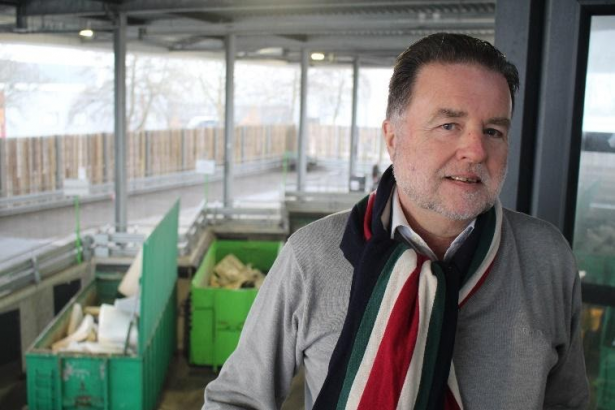
What kind of startups are on site?
We just had the first batch of startups. Ruig & Geroest makes interior designs, like lamps, from trash, Ruik makes perfume from pine needles or orange peels, & Seefd saves and screenprints pre-loved clothes. The Upcyclecentre gives these circular startups the chance to develop their business cases by offering them a workspace, giving them a small startup capital of €5.000, and helping them with collecting the right used materials. In exchange, the startups have to share the message of circularity and stimulate circular behavioral change by giving workshops to residents, children etc. Now we are looking for the second batch of startups: there is a time constraint on how long the startups can remain on site, to give the opportunity to other circular entrepreneurs, further accelerating the transition to a circular economy. It’s sort of like an incubator program. But the City of Almere still offers the opportunity to join a circular hub district.
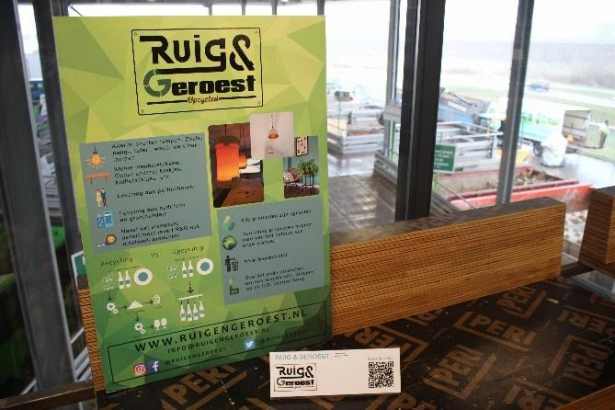
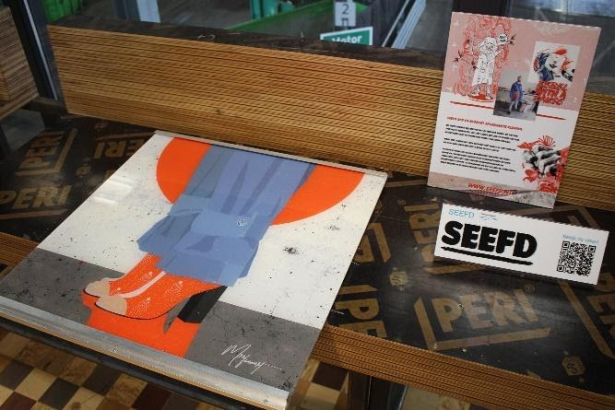
You briefly mentioned that this is the first Upcyclecentre of Europe. Why do you think this hasn’t happened before?
Coincidence or not, Almere is hosting the International Horticultural Expo in 2022: the Floriade. The theme is ‘Growing Green Cities’ and the expo will focus on the green city of the future with growing cities: in 2050 more than 70% of people will live in cities. This created a momentum to do things differently, develop this center and create a showcase for the Expo. It wasn’t easy and it is not something you can do by yourself. The City of Almere collaborated together with the Omgevingsdienst, the Province of Flevoland and the Ministry of Economics & Climate to make this idea into reality.
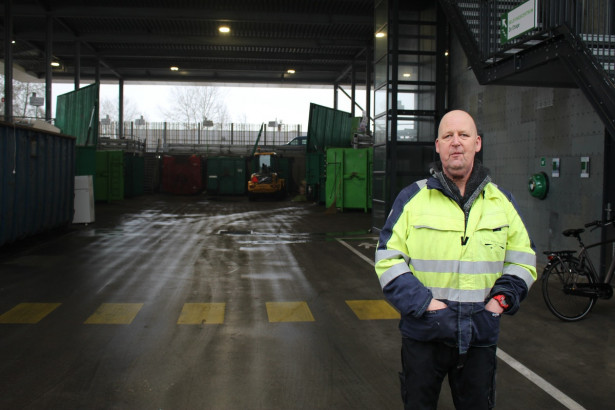
What do you think are the biggest barriers and challenges the Upcyclecentre is facing?
It’s a difficult question. We are really in the start-up phase. 2020 will be the year to prove that the Upcyclecentre has the right to exist and we will focus on measuring the impact we’ve created towards a circular economy. One challenge is the involvement of residents, even more. Or finding the right startups to join the incubator program on site.
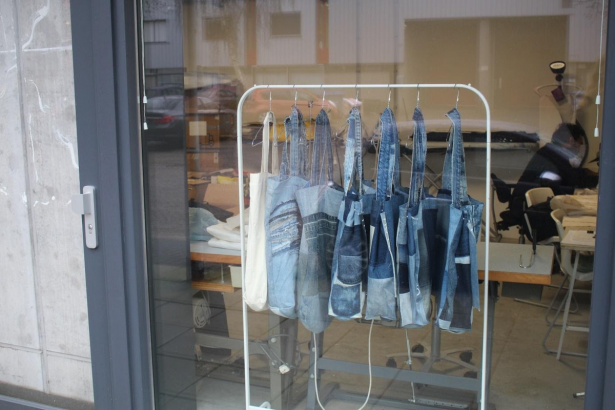
The City of Amsterdam organized a market exploration for a potential Upcyclecentre in Amsterdam North. Do you have any learnings or recommendations for them?
First of all, it is super important to start this initiative with a group of highly motivated people. People who are intrinsically motivated to make this a success. People who believe in the story and want to be an ambassador for the Center. Secondly don’t underestimate the power of good marketing and communication. You want to do this not only for, but also with, the residents of the city. You want to use this center to involve and inspire residents to make this transition to a circular economy happen. This means involving the residents from the start and also reducing potential barriers for users of the center. Make residents your ambassadors as well.
What do you think could be done in your industry to accelerate the transition to a circular economy?
It’s important to show the world that it is possible;a positive outlook on the circular economy. A can-do mentality. That’s what we want to accomplish with the Upcyclecentre. Set an example for the rest of the world and show something concrete and tangible. The city government can take a leading role in this as well. The City of Almere’s initiative is a good example for this.
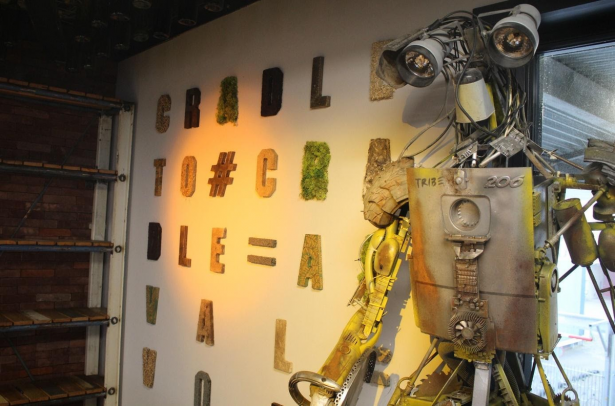
And if we are looking into the future, where is the Upcyclecentre in 5, 10 or maybe even 20 years?
In a dream scenario all stakeholders have a circular mindset: companies, government, educational organizations and residents. But it’s going to be difficult. The first step is relatively easy: mobilizing the frontrunners. The next step is going to be harder: mobilizing the masses. But with the arrival of the new Account Manager, Hede Razoky, the first step in the right direction is made!
-----------------------------------------------------------------------------------------------------------
This interview series is a collaborative initiative of Metabolic, AMS Institute, City of Amsterdam, the Amsterdam Economic Board and Amsterdam Smart City. Working together within the Amsterdam Smart City platform, these organisations are committed to accelerate the transition to a circular economy.
Week of the Circular Economy | Meet the pioneers, learn from them and get inspired!
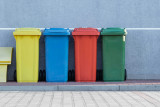
Throughout the week of the Circular Economy, we are shining a spotlight on inspiring sustainable initiatives in the Netherlands. Joining forces with startups, social entrepreneurs, creative professionals, leading companies, and forward thinking governments, to showcase what a circular economy can look like. Meet the pioneers, learn from them and get inspired!
Welcome to the Dutch week of the Circular Economy! Throughout the week, we will be shining a spotlight on inspiring sustainable initiatives in and around the Amsterdam area, by sharing interviews with pioneering projects and companies who are showing tangible solutions to take us from a linear to a circular economy.
Read about startups, social entrepreneurs, creative professionals, leading companies, and forward thinking governments, and learn what a circular economy can look like. We will be publishing 2 articles each day. So, stay tuned!
This interview series is a collaborative initiative of Metabolic, AMS Institute, City of Amsterdam, the Amsterdam Economic Board and Amsterdam Smart City. Working together within the Amsterdam Smart City platform, these organisations are committed to accelerate the transition to a circular economy.
More information about this week: https://deweekvandecirculaireeconomie.nl/
#circulareconomy #WeekvandeCE
Read all the interviews here:
#1 Upcyclecentre Almere
#2 Program Circular Mattrasses
#3 Building bridges from flushed toilet paper
#4 The Zwerfinator
#5 Getting buy-in for products-as-a-service
#6 Loop a.life
#7 Circular Textile Industry
#8 InStock
#9 ECO Coin
Nieuw: publicatie RECURF-UP - Een nieuwe bestemming voor textiel afval
Textielresten die niet meer te gebruiken zijn belanden nu vaak in isolatiematerialen, in paardendekens of in de verbrandingsoven. De Hogeschool van Amsterdam onderzoekt of er een tweede leven mogelijk is voor ons afval.
Het combineren van oud textiel met biobased plastics levert een materiaal op waarmee bijzondere interieurproducten te maken zijn. De nieuwe uitgave Recurf-Up maakt dit proces inzichtelijk en is kosteloos te downloaden.
Measuring the Circular Economy

Part of the transition to a circular economy is measuring how circular our current economy really is. Metabolic fascilitated a workshop with the Netherlands Environmental Assessment Agency, Planbureau voor de Leefomgeving (PBL), which brought government ministries and municipalities to the table, to discuss how best to measure the circular economy in the Netherlands. Intra-governmental cooperation is crucial to measuring the different levels of the circular economy across cities and regions. Check out the report! (in Dutch)
https://www.pbl.nl/publicaties/meten-om-te-weten
And read more about our work here: https://www.metabolic.nl/news/measuring-the-circular-economy-the-dutch-pioneers-leading-the-way/
Vacature Stagiair Content Creation bij vanPlestik
vanPlestik zoekt een enthousiaste content creator / media & communicatie stagiair(e) met talent voor fotografie!
Tijdens deze stage werk je aan externe communicatie in tekst en beeld voor diverse projecten van vanPlestik. In een korte tijd leer je veel over het werken in een klein maar ambitieus bedrijf en zie je van dichtbij hoe onze producten en projecten tot stand komen. Je werkt in een dynamisch, klein en hecht team en krijgt veel verantwoordelijkheid en natuurlijk de nodige begeleiding.
Nieuwsgierig? Lees meer over de stage en hoe je hierop kunt reageren in de bijlage.
Zero Waste Zuidas 2030
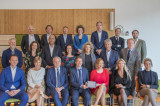
At the annual Green Business Club Zuidas CEO breakfast, 25 CEO's of Zuidas companies signed an agreement on becoming "Zero Waste" by 2030. This initiative is a collaboration with Amsterdam Economic Board. (Dutch)
Tijdens het jaarlijkse Green Business Club Zuidas CEO-ontbijt ondertekenden 25 CEO’s voor een Zero Waste Zuidas in 2030. Het doel: een circulaire Zuidas waar elk restproduct weer het begin is van iets nieuws. Voedsel, grondstof, herbruikbaar materiaal en uiteindelijk energie.
Fred Bos, Senior Managing Director van ABN AMRO licht toe waarom zij een van de initiatiefnemers zijn van Zero Waste Zuidas: “Komen tot nul restafval in 2030 is realistisch wanneer we morgen beginnen. Niet alleen vanwege de technieken en innovaties, maar juist ook vanwege dit bestaande samenwerkingsverband.”
Met grote volumes samen naar nul
Met ruim 43.000 werkzame mensen vormt Zuidas het grootste zakendistrict van Nederland. Hoewel exacte cijfers niet bekend zijn, wordt er ruim 4 miljoen kilo afval geproduceerd op jaarbasis, waarvan het grootste gedeelte restafval is. Met het ondertekenen van de overeenkomst committeren bedrijven zich aan het gezamenlijk aanbesteden van afvalstromen. Deze aanpak creëert volume, waardoor afval zo optimaal en hoogwaardig mogelijk kan worden verwerkt. In 2020 starten de deelnemers met papier, karton, plastic en organisch afval.
Ronald Voorsluijs, CEO van Milieu Service Nederland, zet in op zero waste en zero emission: “Zo wordt bijvoorbeeld het organisch afval van de Goede Doelen Loterijen op locatie gecomposteerd. Medewerkers kunnen het compost voor eigen gebruik mee naar huis nemen. Dit voorkomt afval én gesleep.”
Samenwerking
Zero Waste Zuidas is een initiatief van Amsterdam Economic Board en Green Business Club Zuidas. De participanten van Green Business Club Zuidas zetten zich al jaren in voor het verminderen van het restafval en het hoogwaardig verwerken van monostromen. Bestaande initiatieven zijn een goede basis voor verdere samenwerking tussen participanten en opschaling. De Amsterdam Economic Board werkt aan een regionaal grondstoffentransitieprogramma waarbij samenwerking en schaal essentieel zijn voor innovatie, vernieuwing en grootschalige verandering.
“Zero Waste Zuidas betekent circulariteit als uitgangspunt door de hele keten. Dat houdt in: anders ontwerpen, inkopen, slimmere logistiek, duurzame bronnen en hergebruik. Wanneer dat in Zuidas lukt, lukt het overal. De blauwdruk van deze beweging, het hoe en wat, kan door andere zakendistricten, bedrijventerreinen, overheden en Green Business Clubs worden gebruikt om afvalstromen volledig circulair te maken”, aldus Marjolein Brasz, Challenge Lead Circulaire Economie bij de Amsterdam Economic Board.
Looking for students graduating on plastic waste or clean water!
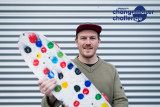
Do you know someone graduating on plastic-free or crystal-clear water solutions? Tip them to apply for the Dopper Changemaker Challenge by 12 April > https://bit.ly/CMCTip
If that someone is you, submit your graduation topic > https://bit.ly/DopperCMC
What's at stake? Grants of up to €5,000 to boost your graduation project, intros to a valuable business network, free entrepreneurship training by Impact Hub and promo support to share your idea with the world!
Follow in the footsteps of Jonathan Morrison (pictured), who went from ad man to the Head of Operation at WasteBoards - skateboards handmade from plastic bottle caps discarded at music festivals or fished out of Amsterdam’s canals by Plastic Whale!
Expert meet-up #1: Impact
You think your plastic waste is useless? Not according to our experts! Two weeks ago, we had the pleasure of welcoming a group of experts in the field of circular design in our workshop. It was the first meet-up in the series of events on our research project “van Plestik, your own plastic“. Missed out on the event? Read all about it on our website.
Startup in Residence Sustainability is live!
Startups & scaleups! Check out our 2019 programme and sign up now!
Startup in Residence invites sustainable entrepreneurs to collaborate with the local government towards solving 18 sustainable city challenges. The sustainability challenges cover a variety of topics including waste recycling, new energy sources, sustainable sports city, climate-proof city, etc. Add to that, we as a municipality, would like to become more innovative and sustainable. Find the complete list of challenges here: http://bit.ly/2tbYfmN !
Apply for our programme now! We’re looking forward to receiving your applications from February 5th until March 24th 2019!
Crowdsourcing insights and ideas online to solve four circularity challenges around food waste, education, plastics, and access over ownership!

Interested in winning a free ticket to Beyond Next, the circularity festival (https://circle-economy.com/beyond-next), including travel and accommodation if you are not based in Amsterdam? Interested in contributing to a circular economy with your research and ideas?
Circle Economy has partnered up with the Amsterdam Fashion Institute, ABN AMRO, Gemeente Amsterdam and HEMA to run challenges to accelerate the transition to a circular economy.
You can now submit existing research, facts and figures, inspirational examples, and other key insights related to these challenges. The challenges cover four major themes of education, product as a service, organic waste in a circular city, and single use plastics.
We will synthesise and openly share the results of this crowd-based exploration on Circle Lab, the online platform for the circular economy, for everyone to find inspiration in, learn from, and use in developing new solutions.
These results will also support attendees of the Beyond Next Challenge Track as they ideate and prototype new solutions to the challenges throughout the two-day festival.
THE PRIZE
Send in some research and you could win a free trip including entry tickets worth €150 and accommodation and travel expenses up to €1,000!
Eight winners will be chosen based on a combination of the number and the quality of their contributions.
For more information on the challenges and how to contribute, check out the challenges below:
Beyond Ownership > https://circle-lab.com/group/26/ideas
How can we promote access over ownership in the household?
Brought to you by ABN AMRO
Beyond Plastics > https://circle-lab.com/group/28/ideas
How can we transition to a system free of single-use plastics?
Brought to you by HEMA
Beyond Education > https://circle-lab.com/group/27/ideas
How can fashion education equip students for a ‘new reality’?
Brought to you by the Amsterdam Fashion Institute
Beyond Leftovers > https://circle-lab.com/group/29/ideas
How can we effectively collect and use organic waste throughout the city? Brought to you by the Gemeente Amsterdam
Fashion Revolution With Biodegradable Textile
Pollution is the major problem all over the world. There are many industries that contribute to this pollution. But do you know that the clothes that you wear are one of the biggest reasons for the growing pollution? Yes, you heard it right. According to reports, the fashion industry holds the second place for being the most polluting industry in the world. Research says, 20% of global waste is generated from the fashion industry. Along with this, the industry is also responsible for 10% of global carbon dioxide emission which is extremely harmful to the living creatures. However, after realising how much pollution this industry is causing, experts are trying to come up with the sustainable solutions. Scientists all over the world are working extensively to decrease the pollution level generated from the fashion industry.
Stay up to date
Get notified about new updates, opportunities or events that match your interests.

